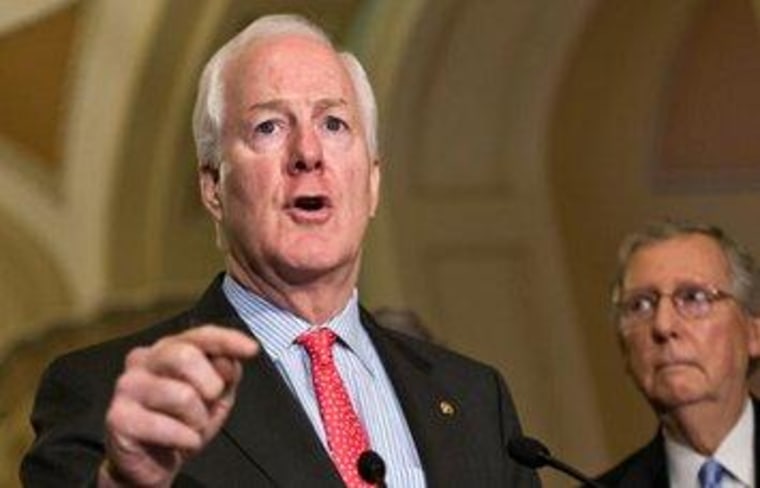In March Senate Minority Whip John Cornyn (R-Texas) appeared at an event in Atlanta, and publicly endorsed U.S. intervention in Syria. Then President Obama expressed support for military strikes in Syria, at which point Cornyn reconsidered.
Indeed, in a curious twist, the Texas Republican said this week "many questions are still left unanswered," which led to a meeting with the president in the White House in which Cornyn asked no questions.
All of which leads us to now.
A Cornyn aide said Thursday that the senator currently opposes the Syria resolution, which will be debated on the Senate floor next week."If the vote were held today, Sen. Cornyn would vote no," said Megan Mitchell, a spokeswoman for Cornyn.
The immediate significance of this is that Cornyn is the first leading congressional Republican to express opposition to authorizing the use of force. In the House, the top two GOP leaders -- House Speaker John Boehner and House Majority Leader Eric Cantor -- endorsed the resolution earlier this week, while in the Senate, Minority Leader Mitch McConnell is too afraid to say much of anything.
But it's the larger context of announcements like these that stand out.
Kevin Drum had a gem on this yesterday.
There's obviously a bit of hypocrisy on both sides in this affair, but I have to say that watching Republican pols and conservative pundits get on their high horses about Syria has been pretty nauseating. These are guys who mostly have never met a war they didn't like, and until a few months ago were practically baying at the moon to demand that that President Obama stop diddling around and get serious about aiding the rebels and taking out the monstrous Bashar al-Assad. But now? Butter wouldn't melt in their mouths as they talk piously about the value of multilateral support; the need to give diplomacy a chance; the perils of regional blowback; the lessons of Iraq; and the fear of escalation if Assad retaliates. You'd think they'd all just returned from a Save the Whales conference in Marin County.There are some Republicans who are perfectly serious about their desire not to get entangled in yet another Middle Eastern conflict. But most of them couldn't care less. Obama is for it, so they're against it. It's pretty hard to take.
Bill Kristol published an interesting item this morning, urging his party follow the president's lead on Syria. "The fact is that Obama is the only president we have," Kristol wrote. "We can't abdicate our position in the world for the next three years. So Republicans will have to resist the temptation to weaken him when the cost is weakening the country. A party that for at least two generations has held high the banner of American leadership and strength should not cast a vote that obviously risks a damaging erosion of this country's stature and credibility abroad."
Now, as a skeptic of U.S. intervention, I'm not at all convinced that restraint in Syria will "weaken the country." But what's interesting to me is that Kristol seems to believe congressional Republicans, en masse, can separate their political instincts from their foreign policy worldview.
In recent days, it's been made abundantly clear that they cannot. Putting aside the merits (or lack thereof) of intervention, most congressional Republicans appear to be approaching this debate the same way they approach every debate -- as post-policy partisans who define themselves by their objections to a president they hold in contempt for reasons that are generally incoherent.
